A good night’s sleep is the one thing that keeps your overall body and mental health in check. Not getting enough sleep at night can affect your both mental and physical health and bring a lot of negative consequences and we at Weighted Journal decided to put together a few tips to help you sleep better!
So here we go with our 25 tips for better and faster sleep at night. All 25 have been proven to work – they will help you fall asleep faster, keep you in a deep sleep state longer and even help you out if you have trouble falling back to sleep if you awake.
Check them out:
1. Follow A Strict Sleep Schedule
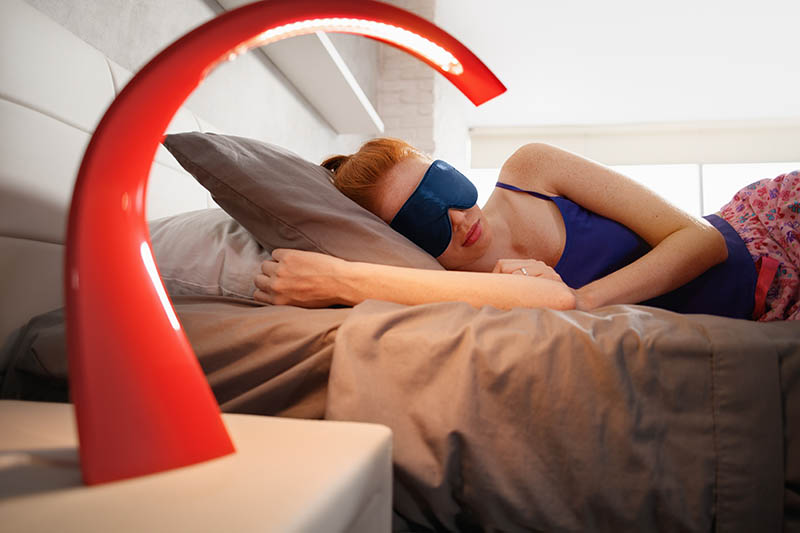
This is by far the number one and probably the most important rule that you can follow and this is also considered as one of the top sleep tips. Try to follow a strict sleep schedule. It will immensely help you to be able to fall asleep on time, wake up on time and most likely help you achieve a healthy sleep cycle through the night. Follow this routine and it will keep you fresh and active throughout the day. The basic sleep that a human body requires to perform at optimal levels is usually 8 hours long and following this rule will help you in a great way.
For example, if you have to wake up at 7 am to be at work by 8.30 am, you should be well asleep by 11 pm to get a full 8 hours. Going to bed at 10:30 pm should give you enough time to calm your body down to fall asleep quicker.
I know routine sounds boring, but to get a healthy night of deep sleep, you need to teach your body when it is the right time to sleep and the right time to wake up. You can’t expect it to know automatically – for example, it will be very hard to achieve healthy sleeping habits if you’re going to bed at 10 pm one night and 4 am the next one – it throws your body and mind off balance.
2. Avoid Daytime Naps

Avoiding daytime naps is crucial if you have any trouble falling asleep at night – even if you feel groggy and tired in the early afternoon. Going back to rule number one, if you went to bed early and managed to get at least 8 hours of sleep during the night, you’d feel much better during the day and far less tempted to take a quick nap in the afternoon.
The main problem is that most people prefer to take a “power nap” for a few minutes after lunch that usually turns into over an hour of deep sleep – sometimes even more. That deep sleep can make you feel tired and restless and prevent you from falling asleep quickly at night.
Avoiding daytime naps is one of the best ways to prevent tossing and turning at night while being unable to fall asleep. It is a bit of a Catch 22 situation but if you break the cycle you’ll definitely feel much better during the day and have far less urges to take a quick nap. Getting a healthy dose of sleep at night is crucial to avoid sleepiness and drowsiness during the day, especially if you follow a strict routine – back to rule number one.
3. Reduce Stress If Possible
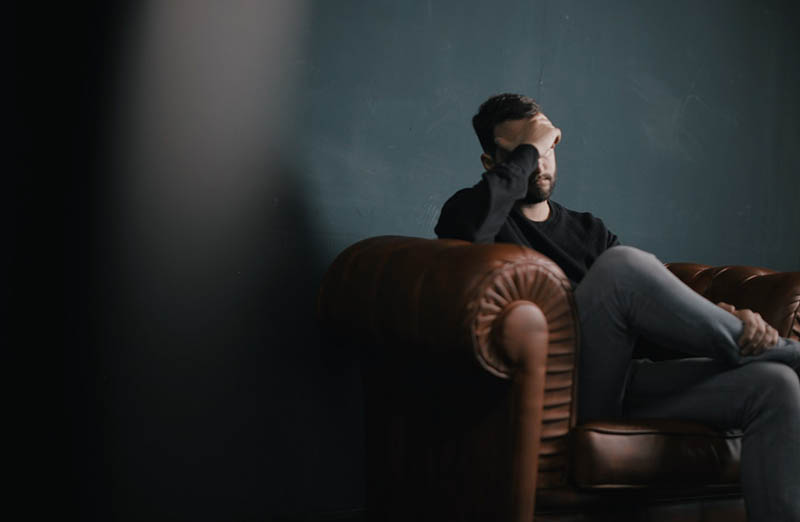
Stress is one of the most common reasons why lots of people can’t sleep well at night. You need to keep your tensions and your worries aside if you want to keep yourself healthy and happy. Try not to think about certain things that stress you out when going to bed – your job, money or anything else in between can wait till the morning. This can be achieved by a simple meditation for 5 to 10 minutes before going to bed. Meditation will calm you down and will put you right to bed on time – you will experience a better sleep for sure.
You can also try to avoid thinking about the stressful things in your life by doing something pleasant instead – like reading a good book or listening to your favorite music before bed. Doing something pleasant for a change will divert your mind and put you in a good place mentally – the perfect setup for falling asleep calm and relaxed.
4. Increase Your Physical Activity
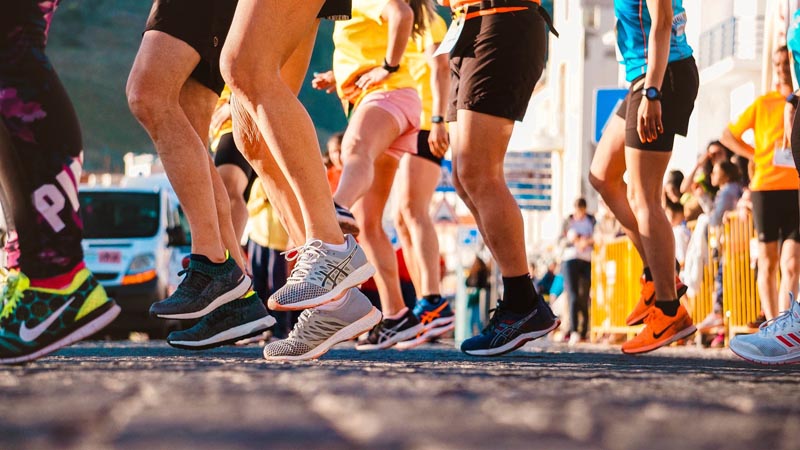
Physical activity is another important tip that you should definitely follow to give yourself a chance of better sleep at night. Physical activity is crucial for burning out all the excess energy you might build up during the day, especially if you’re working behind a desk and you’re sitting in a chair all day.
Physical activity also releases endorphins and promotes feel-good hormones that will immensely improve your mood and well being – crucial factors for better sleep.
You can go for a run and just do a simple exercise routine at home – whatever works for you personally. Not everyone likes going to the gym so even cycling for a mile or two can help you sleep better afterward.
Yoga is another great alternative as it can help your both body and mind. Check out the video below for some very helpful yoga tips for better sleep:
5. Quit Caffeine In The Afternoon or Altogether (if you can!)
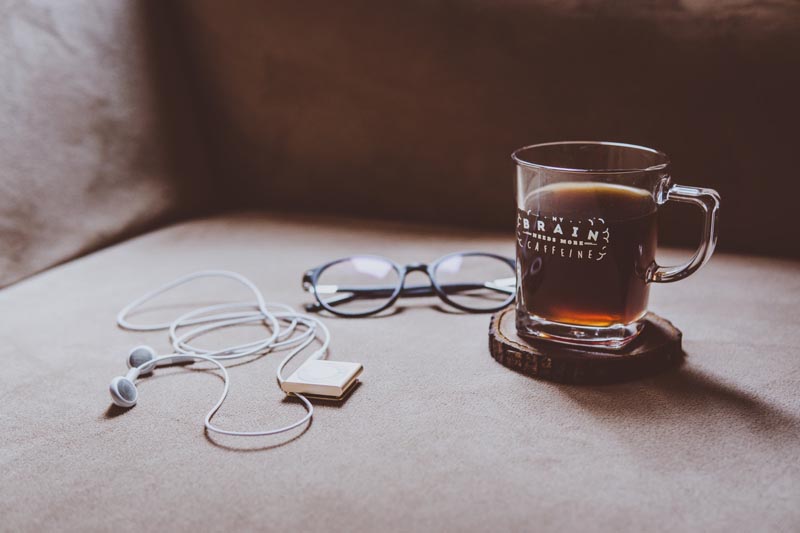
That one is a bit of a personal choice as some people rarely get affected by caffeine while others keep on tossing and turning after half a cup in the morning. But if you drink a lot of coffee during the day and late at night – avoiding caffeine altogether in the afternoon might actually help you sleep better at night.
Caffeine will keep you awake and the rush might last quite a while – something to avoid especially before bed. It’s not just coffee, you should avoid all the food and drinks that contain caffeine. Some of these can be delicious stuff like tiramisu or other coffee-infused cakes and other desserts.
Tea also has a “healthy” dose of caffeine, especially Earl Gray and other traditional British teas. If you’re after a hot cup of tea – opt-out for a tea that doesn’t have any caffeine in it – chamomile or mint are great alternatives. Iced tea might have caffeine in it too so make sure you know what you’re putting in your body before it’s too late.
If you crave something hot to drink at night – have a cup of warm milk.
6. Create A Positive Environment Around You

Positivity within yourself and around you is the key to a healthy and happy life. It is a philosophy that you should definitely try to follow. Try to create and stay in a positive and encouraging environment. Positivity and stress are heavily related so there you go killing two stones with one bird.
Try cutting or ignoring all those negative people around you that always criticize and try to bring you down. I can pretty much guarantee you that you will instantly feel better hence improving your sleep tremendously.
7. Lower The Room Temperature At Night
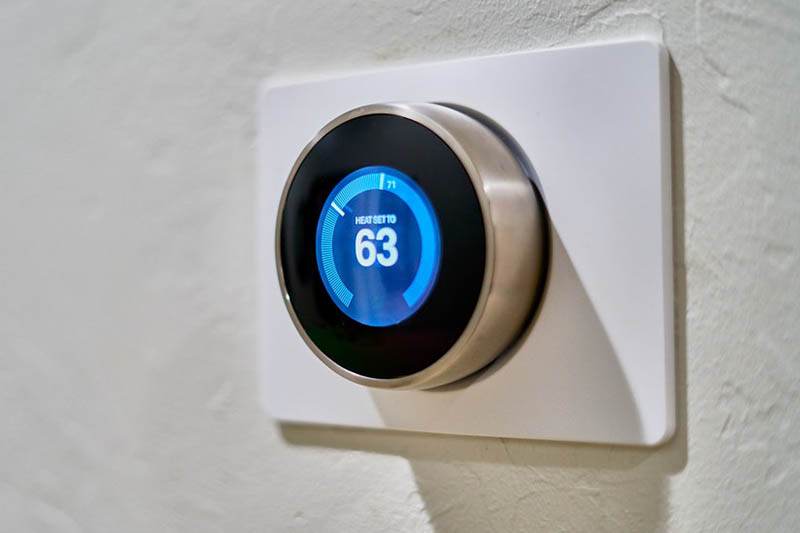
Keeping your bedroom cool is another useful trick that proves to be very useful when you need to fall asleep faster and sleep better overall.
The cooler bedroom will even improve your overall health and well being, it might slow down premature aging and even improve your skin – how cool is that? As the photo above suggests, the ideal temperature of your room is around 63 degrees Fahrenheit. While this might be more of personal preference over anything else, most sleep experts recommend to set the temperature of your bedroom to a setting between 60 and 68 degrees – anything warmer than that might prove to be too warm for most people, especially combined with high humidity.
Another option is to try a cooling blanket – there are lots of products on the market claiming that quality. We’ll probably create a list of recommended products at some point, but we’re still working on it – hang tight. But we can move on to the next point on this list – the mighty weighted blanket.
8. Use A Weighted Blanket
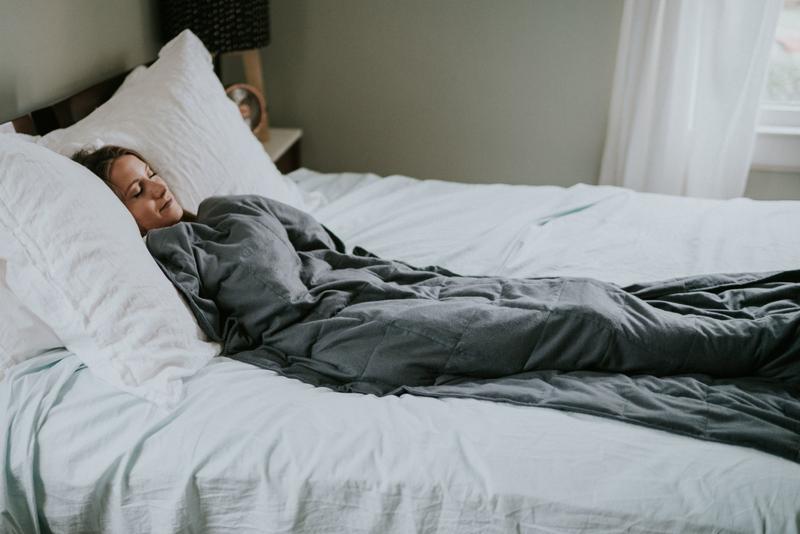
Using a weighted blanket is a whole different world to what you’re usually used to. It offers a number of health benefits and reasons to get one if you have trouble sleeping. They can help relieve anxiety, stress (see tip #3), insomnia, and many many others – just the list is too long to cover it all here. You can see the best weighted blankets compared and reviewed here. More reviews are covered here.
Deep touch pressure therapy is the science behind weighted blankets and it is proven to work for both adults and older children. It is very important not to use heavy blankets to cover babies and toddlers – it is very dangerous as it can prove fatal in some cases.
9. Resist Heavy Meals Late In The Evening

Eating a lot at night is never a good idea – it can lead to a plethora of health and digestive issues. Not sleeping well might be the least of your problems if you’re hit with severe heartburn or indigestion at night. You have to learn to control your appetite in the evening or opt for a healthier, lighter meal in the evening.
Here is a useful tip – if eating light in the evening is not an option – try to get a heartier lunch than usual and see if you can opt for a lighter dinner – like a salad, for example. You’ll suffer less digestive problems for sure and your sleep will improve as well – just don’t go starving before bed – we all know we can’t go to bed hungry.
10. Don’t Use Your Phone In Bed

Using your phone in bed is probably the most successful method to become sleep deprived. Yes, we are all guilty of doing it, but some way more than others.
Try to place your phone away at night and don’t even think of reaching out for it, especially if you’re desperately trying to follow our number one rule – follow a strict sleeping schedule.
Also, if you’re into gaming on your mobile try to stay away from any demanding or particularly hard games at night – playing a game on your phone is a sure way to lose track of time and go to bed way later than planned – time just flies.
So the moral of the story is to keep your phone away at night and it is best if you leave it alone at least an hour before going to bed. Just avoid the temptation to use and focus on something calming and relaxing instead – like reading a book for example.
11. Use The Right Pillow For You
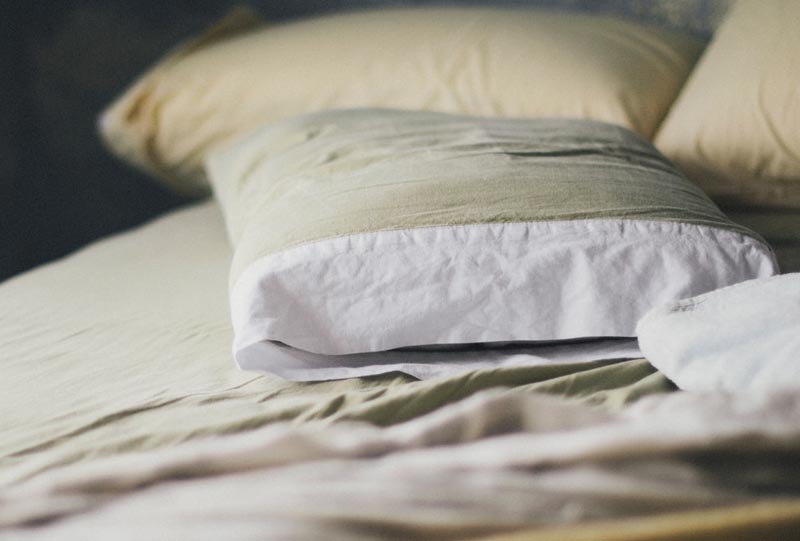
That’s another tip that might be down to personal preference over anything else, but use a pillow that is right for you. If you’re stomach sleeper your pillow needs to be softer and slimmer to better accommodate your head and shoulders. If you’re sleeping on your back you need a harder, firmer pillow to contour your neck and body for a better fit.
Another option is to get a prescription orthopedic pillow from your doctor or chiropractor – especially if you’re having neck or back pain issues. An orthopedic pillow can be a world of difference but choose wisely – not all orthopedic pillows are created equal. It is always best to consult with your doctor if you’re suffering from neck or back pain before changing pillows.
Pregnant women, for example, can greatly benefit their sleep by using a special pregnancy pillow that will contour their bellies and ease the weight of the baby off their spine and shoulders. Pregnancy pillows are a great help to future moms who experience trouble sleeping, especially in the advanced stages of pregnancy.
12. Avoid Doing Work In Your Bed
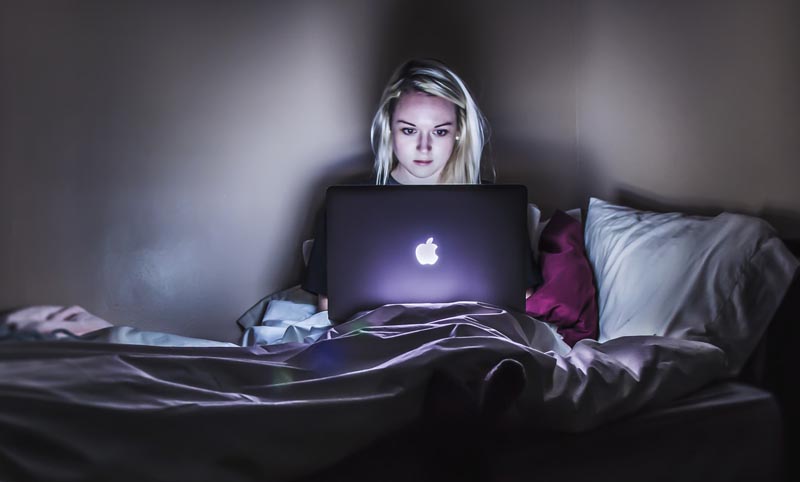
This is the tip you should follow if you have trouble sleeping, but you really love to snuggle in and do some quick work/study on your laptop. I can’t stress enough how important it is to keep your bedroom and especially your bed to bedroom activities only.
Looking at your laptop’s screen at night, right before going to sleep, will reduce the melatonin levels in your body. Melatonin is the major reason you actually do fall asleep – it is a hormone released in your body so the brain can let you know your body it is time to sleep. Lowering melatonin levels means not that you will worsen your sleep quality and might have trouble falling asleep, but by doing so you will worsen your productivity during the next – quite possibly negatively affecting your work and business.
So what’s the best way to go about it?
It is simple – turn off any electronic devices before bed – especially your work laptop or phone, and try to get some shuteye instead.
13. Avoid Excessive Fluids Just Before Bed
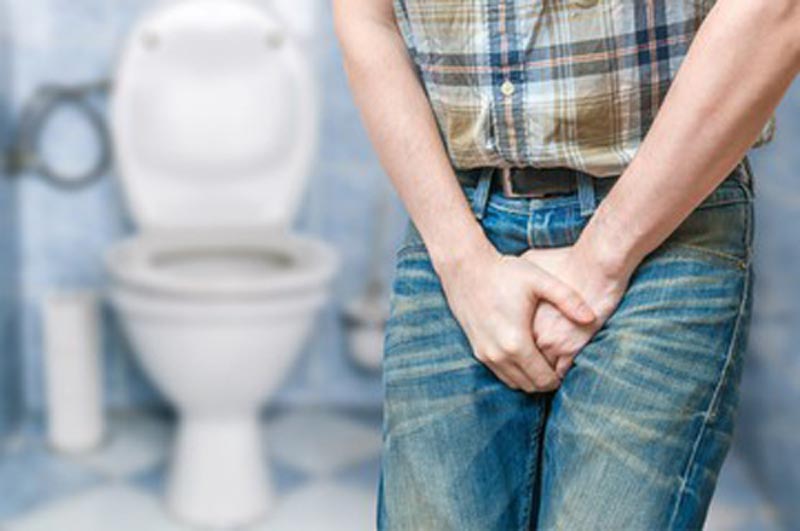
While drinking water during the day has been proven repeatedly to have a number of health benefits, drinking too much right before bed can negatively affect your health and interrupt your sleep cycle.
Why is that?
Well, it’s a bit of common sense, really. Drinking too much water or other fluids right before bed will interrupt your sleep during the night for one simple reason – you’ll be visiting the loo a little too often for your liking. Usually, your body adjusts for the night by reducing your urine production for the night, hence allowing you to get a good night sleep of around 6 to 8 hours.
Drinking a glass or two of liquids right before bed will break the cycle and make you go a lot more – hence severely reducing your sleep quality.
It is ok to drink liquids in the evening, but try to avoid doing at least an hour before going to bed. To improve your odds of good sleep, try to visit the loo right before going to bed – might reduce the chances of getting up in the middle of the night.
You should avoid excessive consumption of fluids just before going to bed. If you do so, you will wake up in the middle of the night to go to the bathroom and this will eventually disturb your sleep and your sleep cycle. Drink only a little bit just to keep you hydrated because you also don’t want to wake up in the middle of the night to drink water.
14. Turn Off The Lights
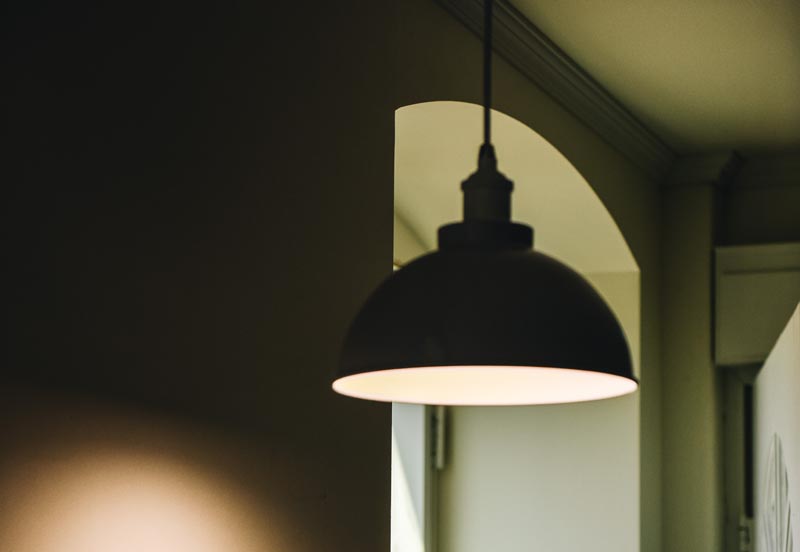
While exposure to light is highly beneficial during the day, at night has a lot more negatives than positives.
The main reason is that by keeping the light on and radiating yourself with blue light, you are actually tricking your brain to think it is still daytime. By doing so your mind will not produce the much-needed melatonin in enough quantity. Melatonin, as we mentioned above, is the main hormone that tells your brain to go night-night.
Blue light, which is emitted in excess by computer screens, phones, and especially modern day LED lights, is the worst of it all – it can break your circadian rhythm and prevent you from feeling sleepy before bed.
Blue light, when experienced during the day, makes your brain alert and focus – something that you need to completely avoid at night. It is one of the most successful inhibitors of melatonin production.
15. Hit The Mute Button

This tip is again based on personal preference, but if you’re already reading this article chances are you already have trouble sleeping well at night.
Some people can snooze off in the middle of a Metallica concert – we envy them all. But, for example, I am not one of those people. I can’t sleep if there is any trace of rhythm or repetitive noises around me. That means any television sounds, radio or music needs to be turned off before I can relax and snooze off.
According to the National Sleep Foundation, and yours truly, medium to high-level noises in your bedroom can increase the feeling of restlessness even during sleep. That means even if you’re asleep and not aware of it, your brain can shift between stages of sleep and not rest properly. It can also lead to twitches, tossing and turning and lower your sleep satisfaction if I can say that.
The problem with sound is that it isn’t as easy to block as most of the factors on this list. And not all sounds are created equal – while mids to highs can be relatively easily blocked by using earplugs, bass can be really hard, if not impossible to block.
16. Take A Bath

Taking a bath before going to bed will give you one of the most relaxing experiences you can imagine, even if you don’t particularly like baths, like me. I used to always resist a hot bath in the evening due to the whole clumsiness of filling the bath with water, choosing the salts and additives for the bath and the whole process of cleaning the tub afterward.
But then when I got trouble sleeping I started using the bath a lot more often, starting to even enjoy cleaning after.
But there is more, there is a whole science behind why a hot tub before bed will definitely help you sleep better. According to a professor at the NY University School of Medicine, your body temperature drops down a few degrees naturally during the night. The process usually starts a few hours before sleep and it “peaks” at around 4 in the morning.
By taking a bath a few hours before bed will raise your internal body temperature a few degrees, meaning there is a steeper drop in temperature at night. That sharper drop significantly increases your chances of going into deep sleep hence vastly improving your sleep quality.
17. Never Use Sleeping Pills

While sleeping pill can be helpful on certain occasions and conditions, they are never a good idea generally. I’m not going to go in detail why they are generally not good for you, but anything that you can easily get addicted to is never a good idea – a golden personal rule of mine.
First of all, sleeping pills can be highly addictive, even the most innocent ones. Many people are not aware of the side effects and the potential dangers of sleeping pills and it is really easy to fall into the trap once you start using them.
Side effects can vary from mild headaches to gastrointestinal issues and ranging all the way much more serious memory problems and even death. Just avoid them.
18. See Your Doctor If Sleep Doesn’t Improve Naturally
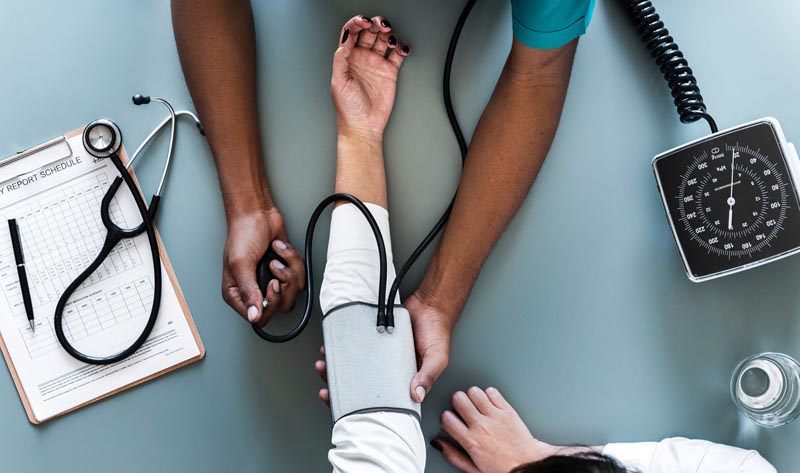
If you’re starting to suspect that your sleep problems are getting out of hand it is always a good idea to pay a visit to your doctor.
They can check any underlying issues and diagnose much better than you if a problem arises. There are literally thousands of reasons why you might not be sleeping regularly and your doctor will be your best bet of finding what is wrong. The more you postpone the visit the worse things will get.
19. Work On Your Bedroom

Home improvement, especially in the bedroom, can be a daunting task.
But you don’t have to gut out the floors or fix the roof shingles to improve the look and feel of your bedroom. You can do relatively simple stuff like painting the walls a more sleep-friendly color, for example or replace the curtains with a thicker version that won’t let through as much light as the old ones.
You can also see if your bed is the right size and softness for you and see if a better alternative is available.
Simple changes like that can vastly influence the way you feel about the room and you can make it your own – a bedroom where you can relax and fall into sleep easier and calmer too.
20. Check Underlying Health Issues
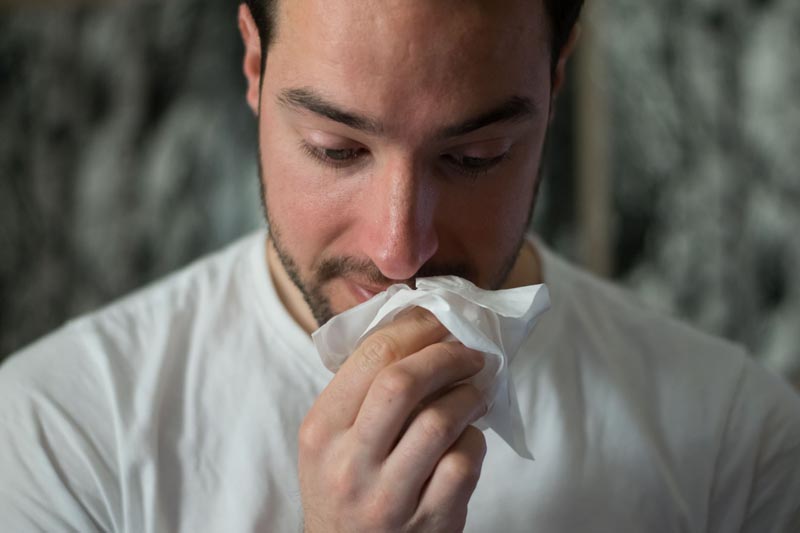
That goes along with point number 18, but it is different enough to be included on this list.
There are a plethora of conditions that might not be a direct threat to your sleep or overall health, but might be annoying enough to keep you awake at night. For example, skin allergies can trigger uncontrollable itching at night hence preventing you from getting much-needed shuteye at night.
Another set issue might me toothaches, stomachs, heartburn and lots of similar non-threatening aches that might keep you well awake.
21. Hide The Clock
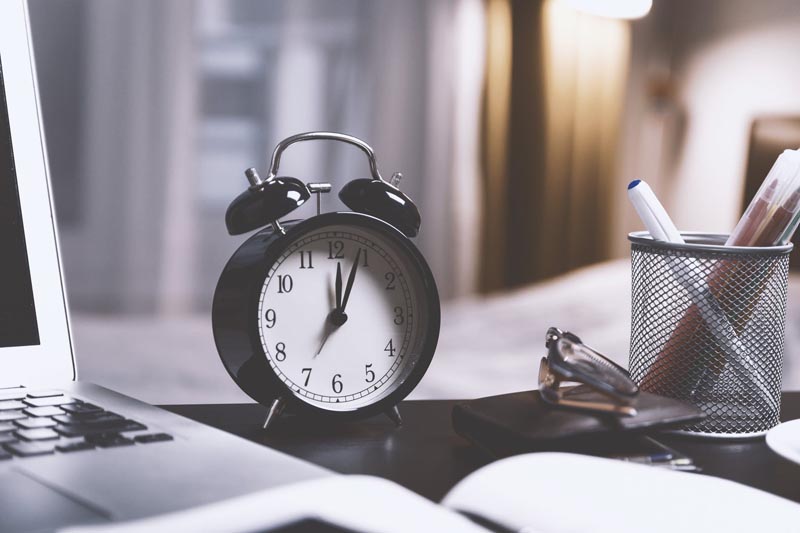
Constantly watching the clock and counting the minutes and the hours not sleeping can be very annoying and might be one of the reasons you’re not sleeping right in the first place.
Watching the clock can trigger anxiety symptoms which will further hinder your ability to get a well-deserved rest at night, especially if the clock dials or digits are illuminated in some way. Just put it away for the night and see if your brain will trick itself into a deep snooze.
Another reason to hide the clock could be the sound it makes – it might fool your brain into counting the ticking preventing it from dozing off.
Don’t forget to set the alarm, tho, especially if you have to wake up early in the morning for work.
22. Don’t Allow Pets On Your Bed
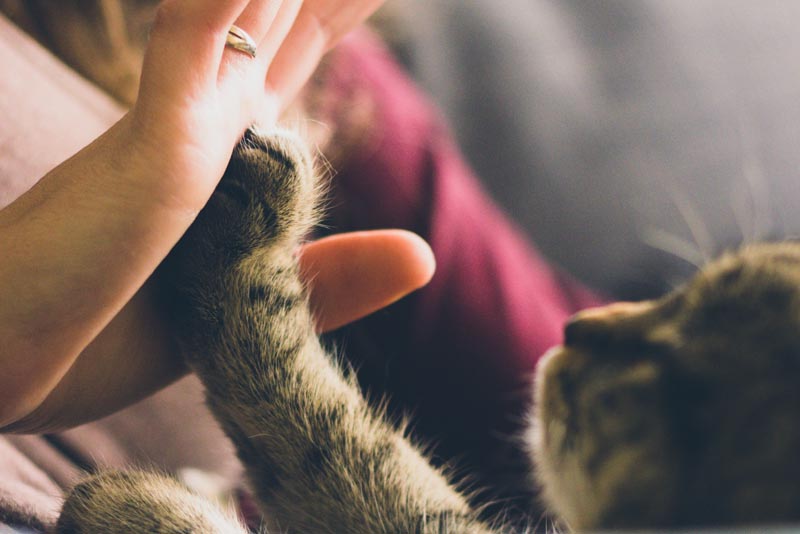
Yes, I know you mean well and it will break your heart to leave your pet outside the bedroom, but try it once – you’ll thank me later, especially with cats.
Some pets are just fine and rarely bother you at night, while others can be a bit of attention seekers and wake you up at night just for the sake it. Say Hello to my cat, for example. Annoying little bugger – wakes me up EVERY morning at 3:30 and then at 6:30. The first night I left him outside my bedroom was a dream come through – dozed off and never woke up for anything during the night.
There is a lot of contradictory information out there whether it is safe and healthy to let your pet in bed or not. Most agree that it is generally safe both ways as long as both the pet and the “parents” are healthy physically. Some studies even suggest that it is healthier to sleep in bed with your canine companion. I would recommend it too if you’re both healthy and you love each other.
Cats, on the other hand, are neither fully diurnal nor fully nocturnal. House cats basically don’t care what time of the day it is – they wake up and snooze off whenever they like – making it hard on people with sleeping issues.
23. Consider Natural Supplements
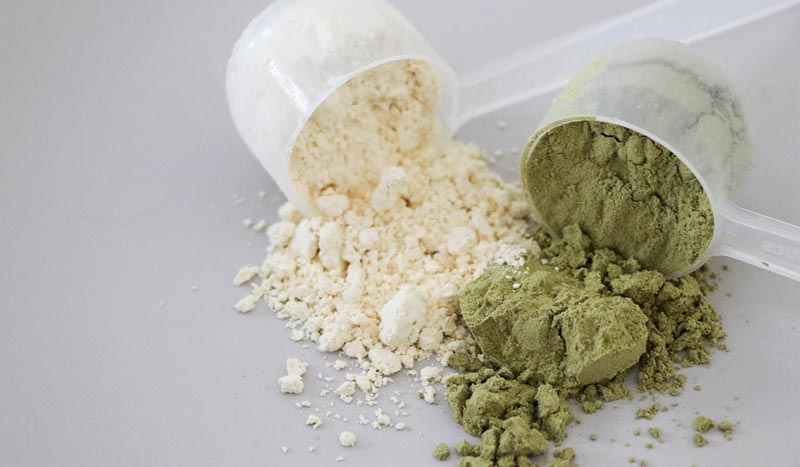
We already mentioned that you shouldn’t ever resort to sleeping pills but what about natural supplements?
There are a number of supplements and herbs that are proven to positively influence your sleep. The main one is melatonin, of course, the main hormone responsible for sleeping. It is non-addictive and non-drowsy and mostly safe for oral use.
Here is the list of the rest useful and proven to work natural sleep aids:
- Valerian Root
- Magnesium
- Lavender
- Passion Flower
- Glycine
- Ginkgo Biloba (1 hour before bed might reduce stress and help you relax)
- L-Theanine
You can find most of these, if not all, supplement over the counter or in numerous natural health stores. Amazon can be an excellent source as well, but be careful with the quality and the quantity of the products you buy – Amazon sellers can be dishonest sometimes. As usual – read the reviews and use your common sense to your advantage.
24. Try A Leg Pillow
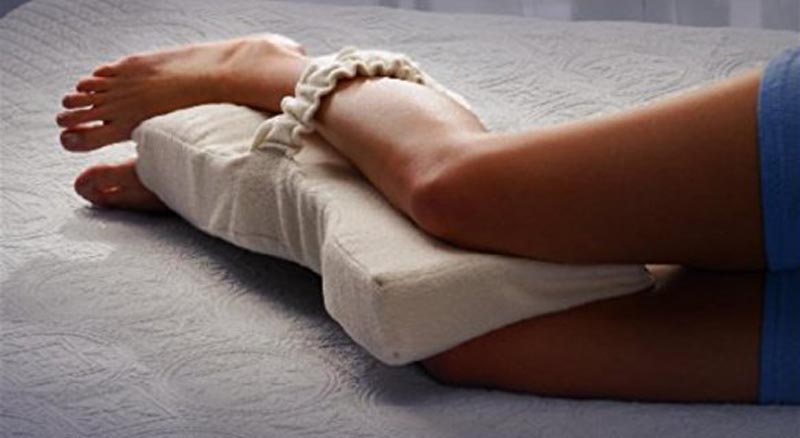
Let me say it from the start – this tip is not for everyone. But if you have any sort of back pain keeping you awake at night these “leg positioner” pillows are a lifesaver.
Sciatica sufferers will greatly benefit from adjustable leg pillow – it helps you keep your spine straight at night hence alleviating the pain associated with sciatica. Side pillow might help you improve your posture during the day – another useful benefit.
25. Try A Few Tricks For Falling Back To Sleep
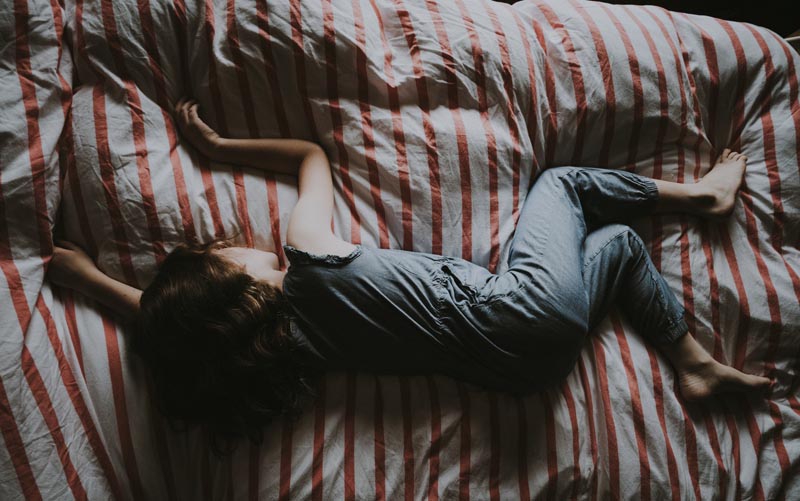
If you’re one of those people who have no trouble falling asleep early in the evening to just wake up a few hours later – these tips are for you.
There are quite a few useful techniques to guide you back to bed and, hopefully, back to the deep sleep you deserve.
For example meditation, deep breathing exercises and progressive muscle relaxation can greatly benefit you if you keep waking up in the middle of the night and you have trouble going back to sleep. Try them all together or one by one and see which of these work for you naturally.
Summary
I really hope that after reading this article you are at least one step closer to having a great night’s sleep, if not 25 steps.
Good sleep is essential to your overall health and well being. If you suspect you might be a victim of sleep deprivation or if you consistently having trouble sleeping for no particular reason please go see your doctor – they will be the best person to guide you forward to solving the actual problem rather than treating the cause of it.
As always, if you have any questions or concerns, please drop me a line in the comments below and I’ll try to get back to you as soon as possible!

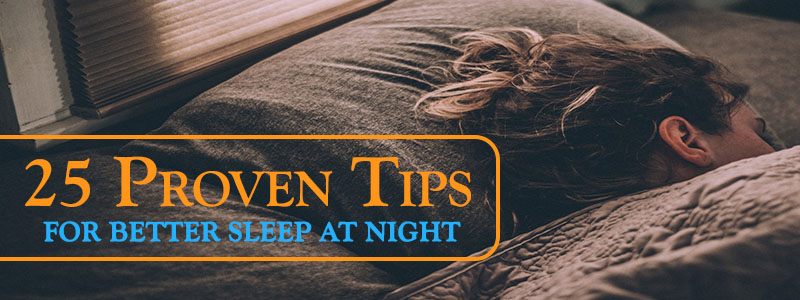
Thanks for sharing such brilliant content on sleeping tips. I have read all these tips and seems to be very effective for improvement of my sleep cycle. I am a patient of sleep apnea and am using a CPAP mask. For me, it is very important to sleep in a normal way and I have decided to follow these tips in order to stop dependency on the CPAP mask and they seem to work!